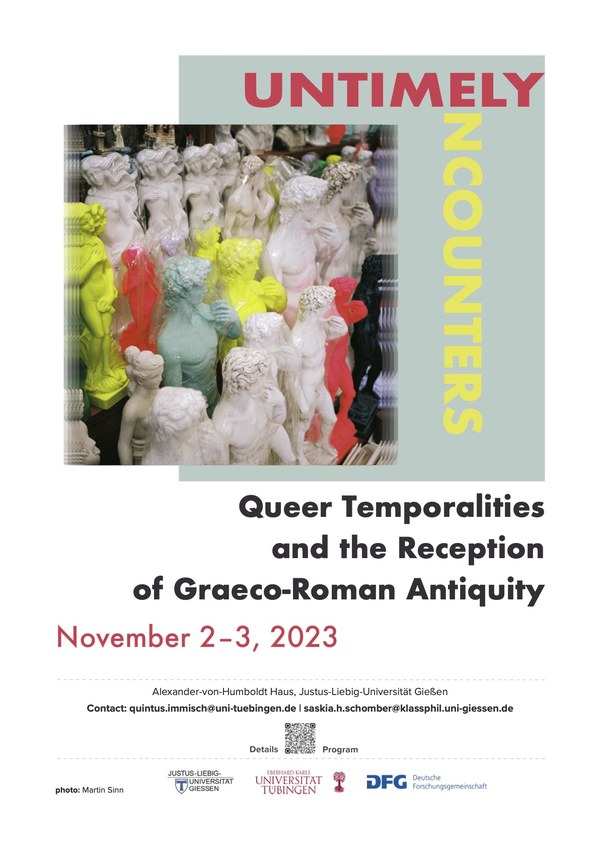Untimely Encounters. Queer Temporalities and the Reception of Graeco-Roman Antiquity
|
Untimely Encounters explores the intersections of Queer Temporalities and ‘Classical Reception’, bringing together scholars from Queer Studies, Reception Studies, Classics and Comparative Literature. For some decades now, scholarship on the reception of Graeco-Roman antiquity has teamed up with Queer Studies to explore the overlaps of queerness and antiquity throughout the ages. The conference Untimely Encounters. Queer Temporalities and the Reception of Graeco-Roman Antiquity focusses on these interrelations of past, present and future by questioning and queering the temporalities of the so-called ‘Classical’ reception. In Queer Studies, there has recently been a return to questions of time and temporality, foregrounding the concept of Queer Temporality. While the issue of temporalities and the notion of Queer Temporality has been occasionally taken up in the study of antiquity and its reception, a more in-depth-inquiry into the intersections and entanglements of queerness, temporalities and the reception of Graeco-Roman antiquity is lacking. Queer Temporality involves the contouring of temporality “as a potent analytic category to examine queer life as reflected in cultural history” (Frackman and Malakaj 2022, 356): Using the concept of Queer Temporality, the time-specific symbolisms, experiences and practices with which queer life is endowed in societies are made visible, in order to capture how queerness challenges conventional understandings of time as linear, progressive, uniform, in favor of notions of dis-/continuity, multiplicity and fluidity. In this way, Queer Temporality addresses aspects of temporalization that also play an important role in recent Classical Reception Studies: genealogical (in)dependencies, crossovers of Graeco-Roman antiquity with later contexts and literatures, and fluid chronologies, privileging non-linear models of reception. Moreover, questioning the progress-based ideology of historicism, in the methodological paradigm of Queer Unhistoricism, the engagement with Queer Temporality abandons strict chronology and investigates surprising similarities and relationships of proximity between different epochs, contexts, and constellations. Our conference wants to explore the ways in which queer temporalities structure, define, challenge, enrich, change, or defy the literary reception of Graeco-Roman antiquity. Reception is understood in a broad sense and is not confined to any specific historical period. The scope of the conference is comparative, focusing on, but in no way exclusively aiming at European and Anglo-American literatures. |
– – Conference Program – –
Organizers: Quintus Immisch, Peter v. Möllendorff, Saskia Schomber

